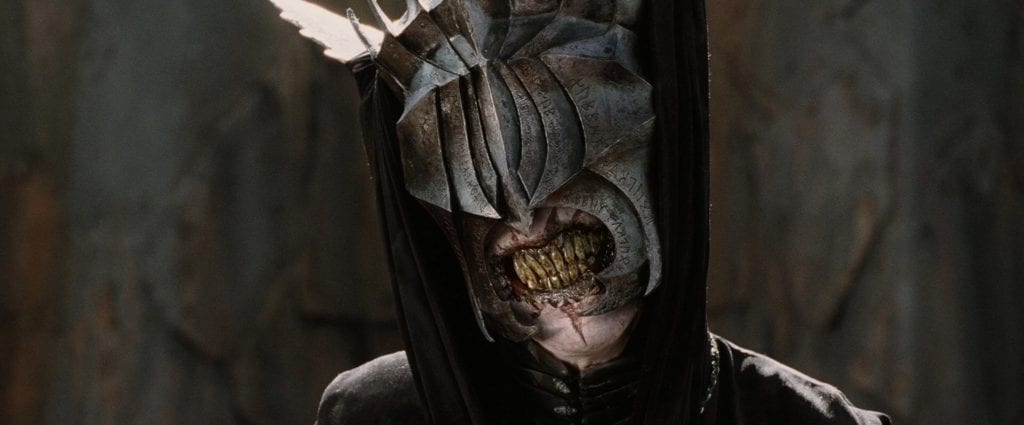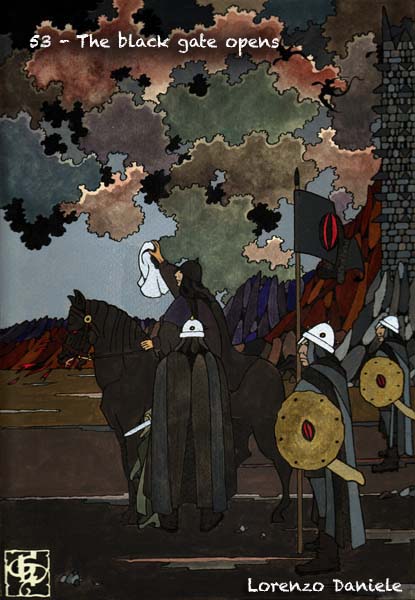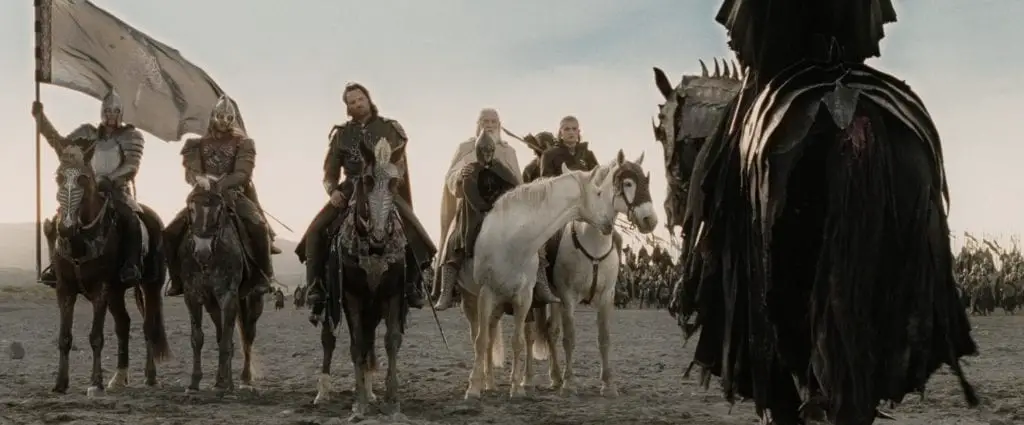“The Black Gate Opens” surprised me.
I’ve read The Lord of the Rings quite a few times by now (though not in a number of years). Over this re-read I’ve remembered things I’d forgotten and appreciated remembered things in new ways. But “The Black Gate Opens” was different. This chapter is relentlessly, roilingly dark. And as I read through the confrontation with the Mouth of Sauron it really plucked at my memories, reminding me of how… terrible? this chapter was to me when I first read it when I was twelve.
With the knowledge of things to come, “The Black Gate Opens” is a chapter full of pageantry. The Lords of Gondor (and company) lack the firepower to be effective on the battlefield and instead stage a grandiose last stand in a desperate bid for attention. Sauron knows they don’t have a chance, yet still sends out a mouthpiece to mock and dishearten them before they die. The real story—as Tolkien implies again and again here—lies now with Frodo.
But without that knowledge, this chapter is brutal. Things begin grimly, with our heroes marching out to a battle that (even if every piece falls into perfect place) will likely leave them dead. When they arrive to take their stand, they are told that it is useless. Frodo, as we were told chapters ago but haven’t had to confront head-on in a while, is alive but taken by the enemy. He is mocked, and then promised a fate of torture and despair in Barad-dûr. The Ring, presumably, is taken. The thread of hope gets cut. And then the gates open, impossible numbers of enemies pour out, and Book V wraps up as their sheer weight crashes bodily into thin battle lines that are immediately overwhelmed.
It’s a ruthless chapter, and it’s clever. It’s a narrative kneecapping after several chapters of rising hope, reminding the reader of how tenuous and precarious the victory at Minas Tirth had been. It’s a reorientation of the narrative back towards Sam and Frodo. And in its last two pages it’s a visceral reminder of how terrible Mordor is, just before we’re about to step back inside.
March to the Morannon
From the start of the long march to the Morannon, Frodo and Sam appear—unmentioned—at center stage. The host very literally retraces their Two Towers path. The army marches to the Crossroads and Aragorn has his men restore the beheaded statue Frodo and Sam saw illuminated in a last gasp of sun. They pass through Ithilien, where Sam got his first view of a battle of Men against Men and didn’t like it much, as Faramir set an ambush for the passing Harad. We get a brief, quiet inverse: the forces of Mordor attempt to lay an ambush of their own, only to be quickly and easily subverted by Faramir’s right hand man. And they keep marching north, until they approach the Black Gate from the northwest, “even as Frodo had done.”
Though the overlap with Frodo and Sam is made explicit only once, the choice to highlight these specific aspects of the journey makes The Two Towers spring immediately to mind. And it goes far towards weaving together the two narratives more tightly before The Mouth of Sauron’s revelation of Frodo’s unfortunate accessories brings it crashing home.
The literal retreading of Frodo’s path also highlights how little Aragorn & Co. are able to do, and how powerless they are at this point in the story. Aragorn’s actions along the way are theater, empty gestures. He orders his men to strike down the orc head on the Crossroads statue, to replace it with the flower-crowned head, and “to wash and pare away all the foul scrawls that orcs had put upon the stone.” As they walk through Ithilien, three times a day, trumpets and heralds would proclaim their arrival, announcing their reclamation of land held so long under Sauron’s sway.
These things aren’t useless by any means—at this point all Aragorn really can do is try to keep morale up. Intangible gestures can still inspire. But they are met with such silence. Seeing all our heroes pass along the path of Frodo and Sam but remain unable to aid them in any substantive way creates a mounting tension. The feasibility of any of this feels increasingly frayed and hollow: statues restored with no one to see them, the restoration of leadership with no one to pay homage. This builds over the course of a week, Nazgûl looming overhead, until the Black Gate opens. And then the Mouth of Sauron comes out.

The Mouth of Sauron
If Aragorn and Company have produced a week’s worth of empty-yet-necessary theater, upon their arrival at the Black Gate they are met immediately with overproduced bombast. It begins with a mockery of Aragorn’s own horns and heralds as “there came a long rolling of great drums link thunder in the mountains, and then a braying of horns that shook the very stones.” And then comes The Mouth of Sauron, willing to shred any scenery placed before him.
The Mouth of Sauron, of course, is wildly unnecessary. Sauron has no need to send out an embassy, he has no reason at all to come to any sort of terms. In his own eyes, he’s already won: there’s simply a chance to mock and demean first. The whole thing is a near-absurd piece of pageantry—a nameless man crowing about on a demon horse, offering meaningless terms. But unlike Aragorn’s theater of quiet dignity and questionable efficacy, the Mouth of Sauron’s bombast is backed by unequivocal power.
He’s a marriage of pettiness and power, and it makes him one of the more interesting secondary characters. As he rides out from the gates the reader is told the genuinely daunting fact that “his name is remembered in no tale; for he himself had forgotten it.” He then proceeds to call them stupid and small, using an informal form of grammatical address. He threatens Gandalf for finally weaving webs too far and then shrieks in fear when Aragorn looks at him too hard and Gandalf produces a flash of light (he is a herald and an ambassador AND MAY NOT BE ASSAILED). He rambles about how “dwarf-coat, elf-cloak, blade of the downfallen West, and spy from the little rat-land of the Shire” are all indications of an international conspiracy. He basically winks at them while reading the terms, preening about the fact that he’ll get to rule from Isengard.
The Mouth of Sauron is… campy, and in another context he could have undercut the fear and authority of Mordor. He doesn’t, of course. It doesn’t matter how he acts. He can be whoever he wants. Because it doesn’t matter: in the end he is the one carrying a dagger and a cloak, and a mithril shirt. And he is the one with power.

Eucatastrophe
The coexistence of the Mouth of Sauron’s questionable competency and his wildly over-stacked hand makes the revelation of Frodo’s effects really devastating. He can say whatever stupid shit he wants: as far as they know, Sauron has Frodo. And if Sauron has Frodo, he has the Ring. So it’s done.
The rest of the chapter is simply the impact of this news, first slow then very fast. Pippin cries out when he sees his friends’ possessions, but most of them simply watch in bleary, stunned silence. They listen as the Mouth tells them how Frodo “shall endure the slow torment of years, as long and slow as our arts in the Great Tower can contrive, and never be released, unless maybe when he is changed and broken, so that he may come to you, and you shall see what you have done.” Gandalf attempts to bargain, demanding to see Frodo alive before any terms are made. The Mouth laughs at him. “Surety your crave! Sauron gives none. If you sue for his clemency you must first do his bidding.” And he’s right—Gandalf may seize the hobbits’ possessions out of spite, but it’s simply one more in a line of largely impotent gestures.
And then, bluntly and suddenly, the game is over. The Mouth rides back, horns are blown, and the gate is opened. The interaction with the embassy was a universalizing experience: now even are heroes are in the same place as the poor foot soldiers brought along on this mission, some of whom had already turned back out of despair: “they walked like men in a hideous dream made true, and they understood not this war not why fate should lead them to such a pass.” Any satisfaction in a heroic or meaningful last stand is gone. And then things happen very fast.
The wind blew, and the trumpets sang, and arrows whined; but the sun now climbing towards the South was veiled in the reeks of Mordor, and through a threatening haze it gleamed, remote, a sullen red, as if it were the ending of the day, or the end maybe of all the world of light. And out of the gathering mirk the Nazgul came with their cold voices crying words of death; and then all hope was quenched.
We spend the last page or so of the onslaught with Pippin, feeling that he understands Denethor a bit better: he wishes that Merry were there, so he could die with a friend. The assault isn’t simply an overwhelming, abstract tide of orcs: it’s a visceral, physical attack. The first line “crashed” onto Pippin’s battalion. Trolls broke “like a storm” upon their battle line and “beat upon helm and head, and arm and shield, as smiths hewing hot bending iron.” It’s overwhelming and physical and terrible.
As Pippin loses consciousness his thoughts seem to take a life of their own. And “even as it winged away into forgetfulness” he seems to hear voices crying about the Eagles—that the Eagles are coming. This seems to spark Pippin’s attention for a moment before it fades, and he thinking to himself that no, that was from Biblo’s tale, “long, long ago. This is my tale and it is ended now.” It’s not, of course (fool of a Took). This is Tolkien, and all tales are the same one. But more on that later. See you in Book Six.

Final Comments
- Book Five was very good, yeah? It was one of the trickier feats for Tolkien to pull off, with so many plotlines working on very specific clocks. But even reading it over several months for this series, the book seemed to keep up a pretty breakneck pace. The whole thing has been the unfolding of a continual crisis, but within that Tolkien manages some incredible moments of catharsis and some of his defter character work. It’s been a testament to this re-read that after every book I’ve wound up thinking “wow, huh, I thought __ was my favorite but you know? Maybe it’s this one.” (just kidding it’s book vi).
- I don’t remember if it’s addressed later, so apologies if I’m raising a question already answered in-text. But I do wonder exactly how far Gandalf’s hope is gone after the “negotiations” with The Mouth of Sauron—presumably he’d know via his own Ring if Sauron had reclaimed the One, and the Mouth makes it clear that only one hobbit has been captured. Not great news in any case, but I do wonder if Gandalf still had some hope that the Ring was making its way up Mount Doom despite everything else.
- Related: though I said above that Sauron had no necessary reason to send out his mouthpiece, I do wonder if he was curious enough about the tiny, escaped hobbit spy that he hoped to get some more information before smashing Gandalf and the rest.
- I thought it was a nice touch that the Mouth of Sauron addressed our little band of captains using the informal/familiar thee/thou. It also made me laugh a little that the only other time I can recall this distinction popping up is in conversations between Aragorn and Éowyn. Context!
- Also—while checking on this I learned from the appendices that hobbits don’t have formal form of address at all. They have simply been rude as shit to everyone they meet for the entire story.
- A good parallel: Imrahil insists on using Aragorn’s name (as King Elessar) as they move through Ithilien; Aragorn’s fellow Númenórean The Mouth of Sauron has forgotten his. The Mouth’s backstory is standard Tolkien evil: he worshipped Sauron “being enamored of evil knowledge.” For Tolkien there was no truer path to evil than being a slut for sorcery ¯\_(ツ)_/¯
- Seriously, though, the Mouth of Sauron is great. I found myself remembering the words to some of his overwrought monologues despite not having read them for ten-odd years.
- Are Legolas’s elf-eyes impressive even by elven standards? He’s the only one who can see the Nazgul swooping around above like a bunch of lurkers, despite the presence of Elrond’s sons. Unless one of you can give me better evidence this tumblr thread is canon.
- When the host is passing through Ithilien, land of interesting plants, there is mention of rocky ghylls. I have read this book many times and yet would also swear up and down that I have never seen this word before. It is apparently a “deep, wooded ravine.” It is also apparently usually spelled gill but, I dunno, I guess Tolkien saw one in Wales or something.
- please don’t etymology-shame me, I know the word is not actually Welsh.
- Prose Prize: Pick your favorite brand of despair! I’m partial to their arrival before they Black Gate. They were come to the last end of their folly, and stood forlorn and chill in the grey light of the early day before towers and walls which their army could not assault with hope. The chilly greyness of the morning as they stand there before those hulking silent gates really does it for me. I also enjoy the use of folly here—beyond its most common meaning (a foolish thing to do) it can also mean an extravagant performance or ornamental, functionless tower in an English garden. All are fitting.
- Contemporary to this chapter: So much! After the entirely of Book V to this point took place over the course of about ten days, “The Black Gate Opens” takes up a whole week on its own. As Aragorn and his host sets out from Minas Tirith, Frodo and Sam undertake their long walk through Mordor.
- Oh jeez, guys. We only have one book left? I am stressed. My tear ducts can sense it and have amped up anticipatory production.

